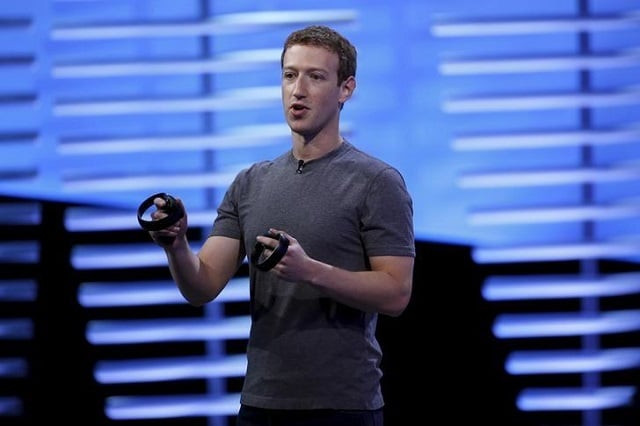Facebook, Twitter will be asked to do more in fight against online extremism
In June, Facebook, Microsoft, Twitter and YouTube announced the launch of an anti-terror partnership

Facebook CEO Mark Zuckerberg holds a pair of the touch controllers for the Oculus Rift virtual reality headsets on stage during the Facebook F8 conference in San Francisco, California April 12, 2016. PHOTO: REUTERS
A two-day meet of Group of Seven interior ministers, which kicks off on the Italian island of Ischia on Thursday, comes just days after US-backed forces took full control of Raqa in Syria, which had become a byword for atrocities carried out by the Islamic State group.
Despite the breakthrough in the battle against IS, the head of Britain's domestic intelligence service said Wednesday that the UK was facing its most severe terrorist threat ever, particularly due to the spread of militant material online.
Facebook evidence and new laws set free child brides in India
MI5 head Andrew Parker said attacks could now accelerate rapidly from inception to action, and "this pace, together with the way extremists can exploit safe spaces online, can make threats harder to detect".
In a first for a G7 meet, representatives from Google, Microsoft, Facebook and Twitter will take part in the talks between the seven ministers from Britain, Canada, France, Germany, Italy, Japan and the United States.
"The internet plays a decisive role in radicalization. Over 80 per cent of conversations and radicalisation happen online," said Italy's Marco Minniti, who is hosting the summit on the volcanic island off Naples.
In June, Facebook, Microsoft, Twitter and YouTube announced the launch of an anti-terror partnership, the "Global Internet Forum to Counter Terrorism", aimed at thwarting the spread of extremist content online.
Facebook has launched campaigns in Belgium, Britain, France and Germany to develop "best practices".
And in September, Twitter touted victories in the battle against tweets promoting extremist violence, saying it has been vanquishing those kinds of accounts before governments even ask.
But last month top Western counter-terror chiefs said they need more support from social media companies to detect potential threats, particularly with militant attacks increasingly being carried out by home-grown "lone wolves".
Tough privacy laws and protections enjoyed by the largely US-based web giants are impeding authorities, they said.
Some firms are using software aimed at helping them quickly find and eliminate extremist content, developed by Dartmouth College computer science professor Hany Farid, a senior advisor to the US Counter Extremism Project.
But Farid told AFP it was unclear how broadly it was being deployed and urged the G7 to "give serious consideration to legislative relief" if the giants fail to "wake up and respond more aggressively" to abuses of their systems.
While some warn terror online will be difficult to conquer, with extremists simply moving onto the dark web, Italian expert Marco Lombardi said militants would not readily give up the mass-audience potential of social media.
Facebook to give Russian ads to Congress, boost transparency
Opportunities for "conversion, propaganda and dissemination" lie "on sites capable of influencing thousands of youngsters with a few 'likes'," said Lombardi, director of the research centre ITSTIME (Italian Team for Security, Terroristic Issues & Managing Emergencies).
The British government outlined an internet safety strategy on Wednesday with proposals it will likely share with fellow G7 members, including an attempt to persuade leading web players to pay for measures to combat dangers.
While Germany has focused particularly on defending itself from cyber attacks, it launched the ZITis surveillance agency last month, which will specialise in "digital forensics" as part of its strategy to fight terrorism.
For its part, despite being labelled an enemy by IS, Japan has escaped attacks to date. Nevertheless, in June its lawmakers passed a controversial bill allowing authorities to target terror conspiracies.


















COMMENTS
Comments are moderated and generally will be posted if they are on-topic and not abusive.
For more information, please see our Comments FAQ